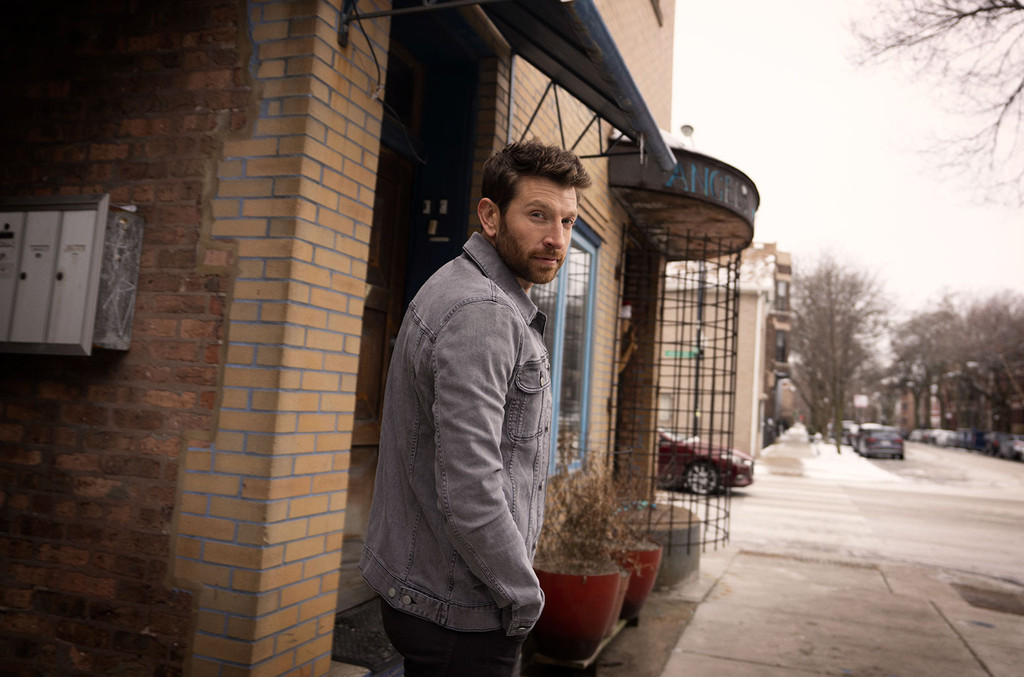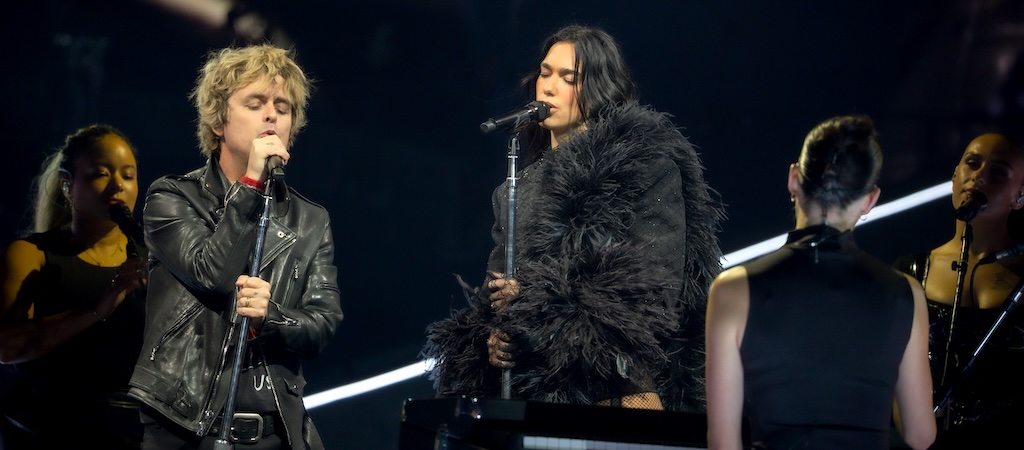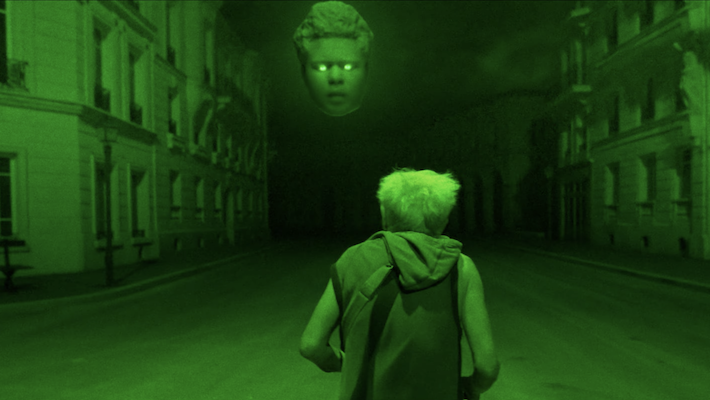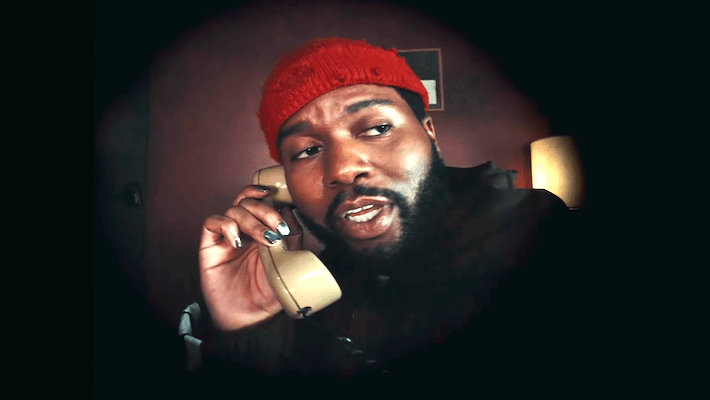By any measure, Brett Eldredge has had a very successful career: he’s scored eight Top 5 hits on Billboard’s Country Airplay chart, including five No. 1s, he has a thriving touring business (until the pandemic), and a devoted fan base. And yet, he felt there was something missing.
So he did something rare for a country artist, he unplugged— from the road, from recording and, literally, from social media. He took time off to do a major personal and professional reset. And when he was ready, he began writing again.
On Sunday Drive, his first studio album in three years for Atlantic Records/Warner Music Nashville, out Friday (July 10), he switches into a higher gear. Prompted by work he did on himself and challenged by new producers (and co-writers) Daniel Tashian and Ian Fitchuk, he created his most compelling set yet, full of musical diversity and heart. First single, “Gabrielle,” stands at No. 43 and climbing on this week’s chart.
The Illinois native, who recorded the album live in Chicago, talked to Billboard about his media blackout, letting himself be vulnerable and why he sees the album as a new path for the rest of his career.
For several months as you started working on this album, you stepped away from social media. You had a guitar, a flip phone, a note pad and a Polaroid camera. Why did you feel such a drastic step was necessary?
I was very well known for being somebody that was on social media. I would wake up and I’d be singing into my phone and all this crazy stuff. I love connecting with my fans in that way, but I got to the point where I was using so much creative energy just to do that it would wear me out before I got to the stage. I set out to be an artist, a musician, and it was a great tool, but I didn’t want to be known as just as some social media guy.
I wanted to put the focus on music and not that I get the distraction of staring at your phone all day and what that did to my mental state. I started to get very aware of that and how anxious it would make me feel and and how distracted it would make me feel from the real stuff in my life that I needed to feel and experience and live through and also write about.
How did your social media hiatus affect what we hear on the album?
The whole process kind of moved into my music as well, even down to when I went to record the album and capturing the imperfections and let them be what they were. I think social media is really hard. We need to put some perfect life on there. And I got tired of trying to live that perfect life. I wanted that imperfection. I wanted to find that. That’s why I went down that route. It made my music 10 times more powerful than I’ve ever experienced.
The album starts with “Where the Heart Is” in which you’re clearly looking for a connection. Why make that the opening statement?
The map of this whole album came from “Where the Heart Is.” Putting that song first really puts into perspective what I was trying to do, which was find the magic in the world again. I was kind of burnt out on music and this life feeling dull. I’d just been running so hard on the road for so long, then all of a sudden, that’s your life, you know? I had to go find that magic that I felt when I first moved to Nashville, when you didn’t get a peek behind the curtain. Back then you just saw it for the beauty that it was and you’re chasing down your dream.
This is your most musically diverse album, encompassing many styles. Did you challenge yourself to stretch your boundaries?
I think this is the most honest, real version of myself I’ve ever been able to be. It was less like trying to be like, “Okay, I want to have a song that sounds seventies pop here, one to sound classic country and this one to sound R&B.” It was more finding some really creative guys that see that I have so many different influences. Let’s write these songs and let them be where they are and then follow where my heart was going. We weren’t even trying to make it a certain way. It’s just they were allowing me to be the kind of the artist that I was always hoping I would be able to find. Not that none of the [previous] records weren’t me, but I think it was finding my way to get to this point where I was like, “Okay, I gotta pull all the layers back.” It made me a little bit uncomfortable because it was out of my comfort zone. That’s exactly what I needed.
On Good Morning America recently you talked about mental health and therapy. The song “Good Day,” which came out of your first writing session with Ian and Daniel, seems like an outgrowth of that and trying to get your mind right.
Yeah. That’s the whole idea for everything with me. I was starting to get self aware of the things that were holding me back in life. Mindset is everything. I started to feel that negativity in my mind at times. And I knew I needed to change [to] waking up and say, “Even if everything’s stacked against me right now, today I choose the day to be a good day and I’m going to put my best foot forward.” That’s the first song we wrote together. Once we got done, sometimes you walk away from a room hoping you said everything you want to say in a song and I think we really did with that.
The title track is the one song on the album you didn’t write. How did it find its way to you?
I was an intern at Universal Music Publishing and I worked in the tape room. It looked pretty much like a glorified dungeon with a bunch of CDs all over the place. I was transferring CDS to MP3s. I would hear all these songs by tons of different writers, hundreds and hundreds of songs. This certain song popped out when I heard it. I was just blown away by “Sunday Drive” by this guy named Barry Dean that wrote there. [Dean wrote the song with Don Mescall and Steve Robson].
It felt like this certain song was written for me, the way I grew up and the way my relationship is with life and my family and everything. Obviously I didn’t have a record deal yet. I didn’t even have anything going on really. I was hoping one day I can get known for my music and I can put this on an album. And lo and behold, one day I do get a record deal. But I’m still not at the spot in my life where this song makes sense, I still need to do some more living.
The years kept going by and albums go by and this album came up and that was a very reflective time in my life. And I was like, this is the time. To be able to give a song life after 12 years or whenever it was that it was written was so special to be able to share to the world and share with the writers. It’s one of the most special songs I’ve ever recorded.
You sound like you can’t wait to get on the road and play these songs. How are you dealing with not touring?
I started the year touring Europe and it was amazing. I had these life-changing kinds of experiences and shows there. Not only did I give myself freedom to make this music, I gave myself freedom to get this incredible band and we’re playing music better than I’ve ever played music before. We’re learning all these new songs and the energy. I’m locked into a place now to where the music on stage is following the music off stage to another level of depth that I think will give me the opportunity to do this for decades and decades to come because I know my heart’s in it now.



